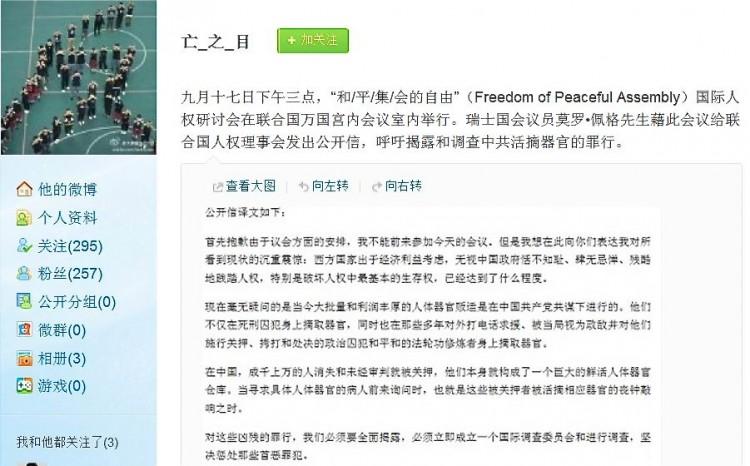The Communist Party in China enforces a regime of Internet censorship so strict that when there’s a gap—especially a big, obvious, gaping one—observers are apt to conclude that it simply must have been deliberate.
So when, soon after it was announced on Sept. 28 that ousted Politburo official Bo Xilai was being expelled from the Party, searches for highly sensitive political terms like “live harvest” and “bloody harvest” were allowed on several popular websites, analysts began trying to figure out what it meant.
“I think only a handful of people really know the meaning of this,” wrote Ethan Gutmann, a researcher who has published extensively on abusive organ transplantation practices in China, in an email.
“It is tantalizing to imagine that this suggests that someone in Party Central was sending a message to hard-liners and latent Bo supporters,” something along the lines of: “‘We could have taken the charges against Bo much, much further. So we’re doing Bo a favor. Walk away. Forget it. It’s Chinatown.’” The last sentence is a line from the 1974 Roman Polanski film Chinatown, meaning in part that grave injustices sometimes go without redress.
Two major Twitter-like platforms, Sina Weibo and Tencent Weibo (weibo means “microblog” in Chinese), lifted the ban on searches for terms associated with organ harvesting. Articles in the Chinese edition of The Epoch Times detailing recent testimony about the topic at the United Nations Human Rights Council were circulated by Chinese Internet users using those keywords.
The terms that were unblocked, like “live harvest,” are almost solely used to refer to the allegations of live organ harvesting from prisoners of conscience, most often Falun Gong practitioners.
A similar sequence of events took place back in March, after Wang Lijun fled to the U.S. Consulate in Chengdu. He was thought to have divulged to U.S. officials his involvement in organ harvesting activities in China’s northeast.
From 2003 to 2008 Wang was security chief in Jinzhou City and ran a medical laboratory attached to the Public Security Bureau, focused on practical organ transplantation research.
In an award speech that was posted online, Wang admitted to participating in “thousands” of on site transplantation operations. Given the context of his remarks, analysts came to the provisional conclusions that many of the transplantations were conducted while the victims were still living, and that most of the victims were probably practitioners of the Falun Gong spiritual discipline, a popular traditional practice that has been persecuted in China since 1999.
Analysts formed the opinion that top Party leaders were aware of Wang’s crimes, and by effectively publicizing information about his connection with them, they were attempting to sanitize, however dubiously, the Communist Party as a whole from involvement.
Sina and Ten-cent microblogs also lifted bans on the names of Bo Xilai, Gu Kailai, and Wang Lijun. Gu Kailai is Bo’s wife and was recently given a suspended death sentence for the murder of British businessman Neil Heywood.
The censorship change, though subtle, sparked discussion and reflection by netizens.
“Such heinous crimes have already been made known in international society, but not many people are aware of it in China where information is heavily blocked,” wrote one user. “The instigators are the most evil extreme leftist forces. They must be accounted for and tried!” The term “leftist” refers to the hard-liners in the Party.
“Live organ harvesting probably strikes the raw nerve of the evil Party, so they dare not talk about it,” a user of Ten-cent wrote.
“Governor B [Bo Xilai] committed crimes of live organ harvesting and the production of human specimens. When will his crimes against humanity be settled?” another user wrote.
Another wrote, “They dare not let the public know of live organ harvesting and organ sale, because they would perish once it becomes known.”
“Everyone knows that the Communist Party takes meticulous care with every statement on the Bo Xilai issue, because it is such a sensitive case. They pay attention to every punctuation mark,” said analyst of Chinese politics Lin Zixu, in an interview with Sound of Hope, a Chinese-language radio network based outside of China.
He said that many people inside China, including Party leaders, already know about Bo and Wang’s involvement in organ harvesting. “Those people in the Party who weren’t involved know that sooner or later this is going to blow up, and then they’re going to have to say that they were investigating it the whole time, so they can push the responsibility onto Bo Xilai and others,” he said.
Lin continued, “But at this point everyone also knows that the fundamental reason this happened in the first place was due to the Communist Party’s system.”
Albert Ding and Ariel Tian contributed research.
CORRECTION: The phrase “It’s Chinatown” used by Ethan Gutmann was a reference to a line from the film noir Chinatown, meaning that injustice persists in the world.





